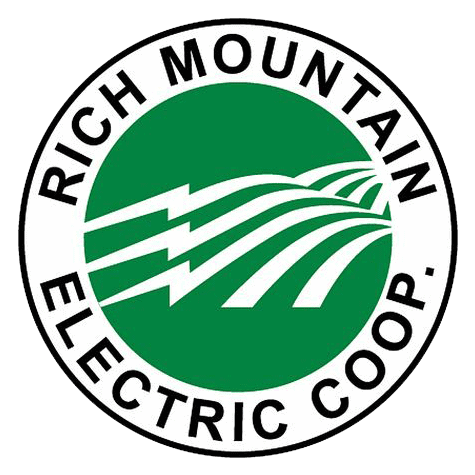RMEC will begin deploying an Advanced Metering Infrastructure system over the next ten months
Rich Mountain Electric Cooperative, Inc. (RMEC) will begin deploying an AMI (Advanced Metering Infrastructure) system over the next ten months. We know that with this change our members might have some questions, so we are providing this Advanced Meter/AMI FAQ sheet to provide answers to some of the most frequently asked questions.
Advanced Meter/AMI FAQ
What is Advanced Meters and AMI?
The AMI system RMEC will be deploying is a Radio-Frequency Wireless Mesh System. “Advanced Meters” are electrical meters that the Cooperative installs to collect and transmit metering information back to the office. These replace the analog type meters which were limited to just displaying the total usage and required the Cooperative to visit each meter monthly to manually read the meter. With AMI meters, RMEC can read the meter remotely from our central office.
How does it work and what data will be collected?
With the AMI system, information from the meter is transmitted back to the co-op. Each transmission will last an average of two to three seconds. It will collect kWh usage, KW and Demand values, minimum and maximum voltage levels, and blink counts. The collection of more accurate usage data will help to improve billing, blinking lights, and outage management.
How secure is the meter data?
RMEC member information security is a top priority. The data transmitted through the AMI system to and from the meter is encrypted using a special proprietary technique. We continue to monitor and test for security threats. None of your account information is included.
Are “advanced meters” accurate?
These meters follow multiple accuracy standards testing. Also, billing exception reports and validation routines on the readings are also performed to ensure accuracy.
What are the benefits of the AMI system?
Here are just a few of the benefits made available through AMI technology:
- Improves electric service reliability and power quality
- Allows more respect for member privacy and property access – With this new system, the only time RMEC will need to physically be at your meter is if there is an electric service problem or when we perform the annual inspection of your electric service.
- Improves outage notification and management process by more quickly pinpointing the exact location of outages, meaning a faster response time.
- Provides additional metering data to better assist members with billing and service questions.
- Gives capability to provide members with valuable usage information such as consumption patterns, outage and blink count history and voltage information.
- Improves meter reading accuracy.
- Reduces losses by identifying power theft.
- Gain efficiency by eliminating the labor and transportation costs of in-person meter reading.
- Ensures better overall safety for RMEC employees.
- Promotes energy efficiency by enabling real-time customer feedback.
Will Cooperative employees need to come to read the meter manually again once the new meter is in place?
The Cooperative will not need to come on a monthly basis to read the meter since it is now being transmitted back to the office. However, reasonable access to equipment still must be maintained. This allows for Cooperative personnel to either read or maintain the meter, if necessary, at reasonable times. Routine inspections of all meters and services will continue in order to look for safety hazards, theft or other problems.
Will the new meter notify the co-op when the power goes out?
This AMI system is stage 2 of a 3-stage process that will allow the Cooperative to be notified of a power outage. RMEC has completed the first stage which is a Geographic Information System (GIS), and at the completion of the AMI system, the Cooperative will implement stage three which is an Outage Management System (OMS). The Outage Management System will notify the Cooperative of an outage and will provide an outage map that will be viewable to our members. The AMI system will detect when it loses connectivity with the meter, which will enhance the Cooperative’s ability to pinpoint outage locations more quickly until the Outage Management System is complete. The stage three OMS is scheduled to be completed by the summer of 2025.
Are there any potential health impacts from a meter that can receive and send data?
U.S. utilities have been installing meters with radios for remote meter reading since the 1980’s. There are now over 50 million of these devices installed and operating in the US without a documented health issue. Additionally, due to the fact that smart meters emit radio frequencies intermittently and at much lower levels than many other safe RF -emitting devices, there is currently no demonstrated risk to the user. The Federal Communications Commission (FCC) has adopted and used recognized safety guidelines for evaluating RF environmental exposure since 1985. A wireless home router RF emission is 400 times greater, and a cell phone RF emission is 1,000-10,000 times greater than a smart meter.
If you have additional questions, feel free to contact Rich Mountain Electric at 479-394-4140 or 1-877-828-4074.
